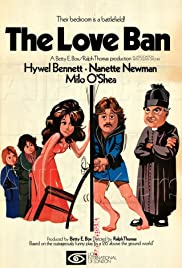
IT'S A 2'6 ABOVE THE GROUND WORLD (ANYONE FOR SEX?)
UK, 1979, 93 Minutes, Colour.
Hywel Bennett, Nanette Newman, Russell Lewis, Angharad Rees, Milo O’Shea?, John Cleese.
Directed by Ralph Thomas.
Anyone for Sex? is a slight and amusing British comedy. The title indicates the tone. It was also called The Love Ban as well as It’s a 2’6� Above the Ground World. This was the era when more soft-core pornography was being seen more widely and the British, reticent on the surface, began making films like Confessions of a Window Cleaner or, more respectably, No Sex Please, We’re British. This film has the advantage of a superior cast which includes Hywell Bennett and Nanette Newman as a married couple – he having problems, being very religious, by having sexual fantasies. Irish actor Milo O’Shea? portrays the local priest. John Cleese has a guest role as a contraceptives lecturer.
The film was directed by Ralph Thomas, who made quite a number of films in Britain in the 1950s ranging from war films (Above Us the Waves) to the Doctor in the House series, to historical films (A Tale of Two Cities) and moving films like Conspiracy of Hearts. A slight film – which indicates a perception of sexual attitudes in Britain at the beginning of the 1970s.
1. The implications and tone of the title? The English title was "It's a 2'6" Above the Ground World"
2. How seriously was the film meant to be taken? Was it merely an example of British humour? Why?
3. Was the film realistic? To that extent was it meant to be taken seriously? Why?
4. The marriage situation and the need for some kind of birth control? Was the film made in good taste? Does this situation have the potential for exploration? For humour? How successfully did the film treat this situation?
5. Mike as a man, husband, Catholic? The humour in his working in the underwear factory? Was he presented as a rounded personality, or a caricature? Kate as a woman, as a wife? Her exasperation, her not sharing her husband's religious beliefs? But her trusting them? The sequences at home with the squabbling and the fights? Were these convincing? Did they emphasise the importance of the theme?
6. The character of Father Andrew? Was he a convincing priest? Or was he a figure of humour? Why?
7. What did the film have to say about Catholicism and conscience in moral matters and in marriage questions? Was this well presented clearly and convincingly? Or glossed over?
8. Were the sexual pressures on the marriage made clear, convincing? The fantasy sequences? Their humour and their reality? (The humour of Father Andrew's fantasies).
9. Did the film discuss adequately the realities of birth control? Pills? Lectures on birth control?
10. Did the sub-plot of the au pair girl and the young man add anything to the film? Did it add to the farcical nature of some of the sequences? How well?
11. How would the marriage be saved? What alternatives were there?
12. The film's style of farce?